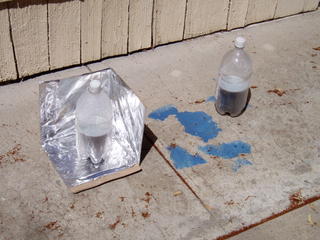Lemme tell you a story. A long, long time ago, before the Internet even existed, before there were even personal computers, there was this insurance company. And this insurance company had a problem: they had all these expensive mainframe computers that were really busy during the day, but the computers were idle at night. But the insurance company had a clever idea. "Why don't we sell some of this idle time to subscribers?" they asked. "We could call it a Computer Service, or CompuServ for short."
And thus CompuServe was born. They added the "e" later.
This baby service grew. In time, they added a bulletin board to it, with places that people could post messages and talk to each other. And they added e-mail. And the users were happy.
But CompuServe had a problem: the information service was really popular. It was a good problem, to be sure, but it meant a lot of people had to make long distance phone calls to connect. Remember, the Internet wasn't around yet, so modems were it.
CompuServe had another clever idea. "Let's build our own network! We'll put put modems close to people, so it's a local phone call, and then we'll collect their data and feed it over our network to our servers, which are now so busy with the information service that they're not doing health insurance anyway." So they built their own private network. Think of it as a private Internet. When I joined CompuServe, I joined the group that was responsible for writing the software that ran that network.
But where to put the modems? In those days, if you wanted a local phone call, you had to physically put a real, honest-to-goodness modem somewhere close to the person making the local call. Sometimes they'd put modems, and network nodes, in people's basements. There was even one on someone's front porch, which worked great as long as it didn't rain.
And then an interesting thing happened. H&R Block, the tax people, bought CompuServe. You see, H&R Block has, or had, these little tax offices pretty much everywhere. And pretty much every tax office had a closet or something similar. So CompuServe could put their modems and network nodes in those closets and sternly instruct the people in the office that it was OK to look at the blinkinlights, but don't touch the buttons or CompuServe would know. (And they would, too -- our software made sure of that.) For many years, CompuServe made a lot of money for H&R Block.
But the marriage didn't last. There was this young upstart called America Online. And there was this Internet thing. And a tax company and computer company just don't have much in common. Eventually, H&R Block put CompuServe up for sale. Then, after the board of directors hired a finance guy, the finance guy came back with bad news: the company was losing cash. There were reorganizations, recriminations, the fancy all-company parties stopped, and many other things changed.
Then the president of CompuServe made an announcement. This long distance company that had made its money in Europe was going to buy us. The long distance company was called WorldCom. Their stock was strong and always went up. They bought UUNET. They bought MCI. They bought the network half of CompuServe -- America Online bought the other half and got the CompuServe brand as part of the deal. There were stock options with 3 year vesting in abundance.
There were more reorganizations. There were name changes: CompuServe Network Services, WorldCom Advanced Networks, UUNET, others that I forget. The org charts moved online, and then vanished, making it hard to know who you needed to talk to in order to get things done. The H.R. manual moved online too: rumor was that it let them change it without notice. H.R. itself moved to Jackson, Mississippi. The bureaucracy intensified. And the stock, well, the stock leveled off, but WorldCom encouraged people to put their 401K money there anyway.
Later, of course, the stock went down. Those of us who exercised our options lost some money. Those poor souls who put their 401Ks into WorldCom stock lost a lot more. Fortunately, I wasn't one of those folks, but friends weren't as lucky.
I left WorldCom in January of 2000. It was with great interest that I watched the recent trial of Bernie Ebbers. And next week, I start Corporations, Criminal Procedure, and Cyberlaw. Perhaps that will give me a new understanding of just what happened.
